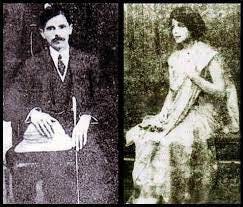Jinnah and Rattanbai Petit: An Interfaith Bond in History
Muhammad Ali Jinnah, the founder of Pakistan, and his wife, “Ruttie” Rattanbai Petit, had a relationship that defied social standards and was marked by unwavering love.
Ruttie Petit was the only daughter of Sir Dinshaw Petit, who was a rich Parsi baronet. It was Sir Dinshaw who provided Jinnah with his first appearance in high court. Jinnah was said to be three years younger than Sir Dinshaw. He was admired by Sir Dinshaw and his wife for his professional success but also for his personal qualities.
Ruttie grew up in a liberal household which saved her from getting married at the age of 13 or 14, instead she attended parties, races and received the same treatment like every adult in the community. During the time, she accompanied her family during travels. As her father was a welcoming host, he spent his holidays with multiple guests including Jinnah. Ruttie and Jinnah fell in love during one of these holidays. Jinnah followed what he thought was the modern custom and approached Sir Dinshaw with a proposal for marriage, which led to the shattering of their friendship. Sir Dinshaw did not see it coming although his daughter spent the entire summer in Jinnah’s company.
Jinnah was twenty-four years older than Ruttie and had known her almost from birth. Ruttie’s age was not the absurd part of the proposal but it was an unspoken rule to not marry out of one’s community.
By the end of the holidays, when all of Bombay’s rich had returned home, the strange and fascinating story of Jinnah and Ruttie had begun to spread. Jinnah was seen wherever Ruttie appeared. They became the talking point for all of Bombay, but Ruttie’s father had rejected the proposal and put him in his place. Despite the opposition faced by her family, she was determined to marry Jinnah.
In order for their marriage to be religiously recognized, Ruttie converted to Islam and adopted the name Maryam. The ceremony took place in Bombay on April 19, 1918, the same date as Ruttie’s 18th birthday. Following their marriage, Ruttie faced alienation from her family and community and was excluded from the Parsi society. Despite these challenges, she stood by Jinnah, reflecting her commitment.
Jinnah and Ruttie’s marriage was a testimony to their determination and love to overcome societal norms and family opposition. Despite the challenges and personal tragedies, their relationship remains a significant chapter in Jinnah’s life.



